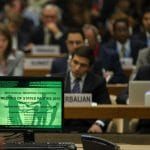Biological indecision
By Malcolm Dando | January 9, 2012
The December 2011 Seventh Review Conference of the Biological Weapons Convention (BWC) in Geneva was widely expected to significantly strengthen international measures in the prohibition regime against weapons of mass destruction. After all, the review came after a series of constructive annual meetings in the second Intersessional Process (ISP) — the meetings and actions taken throughout the five years between each review conference — from 2007 to 2010 as well as in a number of meetings held over the last couple of years in different parts of the world. During these assemblies, important review issues were discussed in some detail and members were optimistic about the December conference.
The mood of delegations was perhaps nicely reflected in American Ambassador Laura Kennedy’s comment in Arms Control Today after a preparatory committee meeting in April 2011. In her view, the meeting “went extremely well — so well, in fact, that we finished a day early, which in my experience happens very, very rarely. … I found that the delegations there were focused on finding solutions and avoiding polemical speeches.” So, did that spirit carry over into the review conference? The United Nations made an advanced version of the agreed upon Final Documentof the conference available online at the end of December.
The Final Document details the substantive results of the conference in its decisions and recommendations section. First, the paper concluded that the ISP meetings between 2007 and 2010 were indeed successful and that all the common understandings reached at these meetings should be endorsed. Then, given the success of the ISP meetings, the report calls for the same system of annual gatherings of states parties in a third ISP between 2012 and 2015 — preceded by a “meeting of experts” to help craft the discussions. However, the structure of the meetings will change; there will now be three standing items on the agenda:
Reinforcing cooperation and assistance among nations. This will include the development of a database system “to facilitate requests for and offers of exchange of assistance and cooperation,” which will be administered by the Implementation Support Unit, a group created to “assist states parties in their efforts to strengthen the implementation of the Convention and reduce the threat posed by biological weapons.”
A review of relevant developments in science and technology. The meetings will explore “new science and technology developments that have the potential for uses contrary to the provisions of the Convention”; will address “voluntary codes of conduct” to encourage scientists throughout academia and industry to act with responsibility; and will promote “education and awareness-raising about risks and benefits of life sciences and biotechnology.”
A commitment to strengthening measures to prohibit WMD — such as the national implementation of efforts “to improve laboratory biosafety and security of pathogens and toxins.”
Also in the next few years, the conference will devote time to consider the improvement in the submission of confidence-building measures (a decision was taken to implement an improved new reporting form) and how to better assist countries in the event of a convention violation. Conference attendees also renewed the mandate of the Implementation Support Unit to provide assistance to state parties. As the ISPs have become the key means of moving the convention forward, all of these changes — which will allow a more consistent focus on critical issues — are truly significant.
Given the often-disappointing history of the Biological Weapons Convention, this might seem like an excellent outcome. However, it is best not to become too excited just yet. Consider for a moment the hopes and expectations that were not achieved.
First, despite calls for state parties to be given decision-making powers when there is clear consensus at annual meetings — for example, in order to address immediate safety concerns, new technologies, or materials security — the conference made clear that no decisions can be taken before the Eighth Review Conference in 2016.
Second, it is not clear how or if the Implementation Support Unit is to be expanded in order to provide better backing for the convention. The report deals with this vital arm of the Biological Weapons Convention rather lightly: “State Parties in a position to do so may consider making voluntary contributions to the Unit to enhance its ability to carry out its mandated tasks.”
Third, there will be no continuing effort during the third ISP to develop or improve confidence-building measures. While the confidence-building-measures submission forms will be improved and some attention will be paid to increasing those submissions, no further work on confidence-building measures themselves will take place until 2016. That’s too bad: A great deal of work has been done in recent years on how confidence-building measures could increase the transparency of states’ biological activities.
Fourth, despite the promotion of universality in the final document, it does not include any significant new mechanism — such as an action plan with a data-driven target — to improve the low level of adherence to the convention.
Fifth and finally, state parties failed to agree on perhaps their most important goal: a verification protocol to ensure that members are living up to their convention obligation to promote adherence to the ban on biological weapons. As US Secretary of State Hillary Clinton put it: “It is not possible, in our opinion, to create a verification regime. … But we must take other steps.” Though few expected to get a verification regime at this review conference, many hoped that at least a continuing discussion on how to improve confidence in compliance would be endorsed. It was not.
The convention is off life support, but it can hardly be seen as in robust good health. There will still be much work to be done in 2016.
Together, we make the world safer.
The Bulletin elevates expert voices above the noise. But as an independent nonprofit organization, our operations depend on the support of readers like you. Help us continue to deliver quality journalism that holds leaders accountable. Your support of our work at any level is important. In return, we promise our coverage will be understandable, influential, vigilant, solution-oriented, and fair-minded. Together we can make a difference.
Topics: Biosecurity, Columnists















